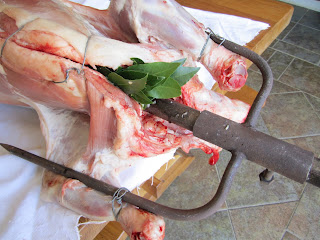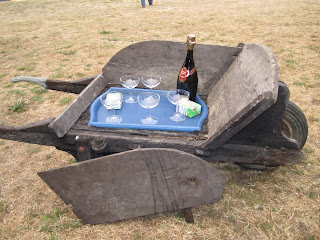 "Today we sacrificed a lamb in honor of my firstborn son." I always hoped I would have a reason to write a sentence so thoroughly biblical. Except is wasn't today, or even yesterday - it was two and a half weeks ago, and this is literally the first chance I've had to sit down at the computer. My new life in Provence is getting the better of me. We left our childcare in Paris, so my days are spent between Augustin and his new blow up kiddie pool (love at first splash), sorting cartons and preparing meals with veggie baskets kindly brought over by the neighbors. (I swear, the photo below is not a mise en scene - it was just that pretty when Mr. C brought it over.)
"Today we sacrificed a lamb in honor of my firstborn son." I always hoped I would have a reason to write a sentence so thoroughly biblical. Except is wasn't today, or even yesterday - it was two and a half weeks ago, and this is literally the first chance I've had to sit down at the computer. My new life in Provence is getting the better of me. We left our childcare in Paris, so my days are spent between Augustin and his new blow up kiddie pool (love at first splash), sorting cartons and preparing meals with veggie baskets kindly brought over by the neighbors. (I swear, the photo below is not a mise en scene - it was just that pretty when Mr. C brought it over.)  Back to the not-so-little lamb. No sooner had we stacked the cartons in our new house in Cereste then we were off to visit G.'s godparents in Brittany. When Augustin was born, G. asked them to host the traditional mechoui (a whole lamb roasted on a spit over an open fire). There was one when G. was born - and for every subsequent child in the family. Rumor has it, there exists an alarming photo of my late father-in-law, munching - Neanderthal style - on a leftover leg of lamb.
Back to the not-so-little lamb. No sooner had we stacked the cartons in our new house in Cereste then we were off to visit G.'s godparents in Brittany. When Augustin was born, G. asked them to host the traditional mechoui (a whole lamb roasted on a spit over an open fire). There was one when G. was born - and for every subsequent child in the family. Rumor has it, there exists an alarming photo of my late father-in-law, munching - Neanderthal style - on a leftover leg of lamb.G.'s godfather, A., has been a cooking mentor to me. His recipes read like poems - not much more than a list of ingredients with a flourish of interpretation. I try to stick close to him in the kitchen - it's the only way. Precious bits of advice drop like pebbles that I sort and collect over time.
 A. and his wife live in a stone farmhouse that has been in her family for several generations.They've turned the old barns into a gallery. There are two resident tortoises, who eat very well.
A. and his wife live in a stone farmhouse that has been in her family for several generations.They've turned the old barns into a gallery. There are two resident tortoises, who eat very well. A. keeps a pair of binoculars handy, to show his grandchildren the foxes that sometimes sprint across the neighboring fields.
A. keeps a pair of binoculars handy, to show his grandchildren the foxes that sometimes sprint across the neighboring fields.  When we arrived, the fire was already going in the old boulangerie attached to the main house.
When we arrived, the fire was already going in the old boulangerie attached to the main house.  On it was a paella - a surprisingly ubiquitous dish in France.
On it was a paella - a surprisingly ubiquitous dish in France. The rice was bubbling away in a saffron sauce, and A. added the raw shrimp as we arrived, which started to pink up immediately in preparation for the hungry crowd. Our aperitif, always champagne when my mother-in-law is around, was served on an old wheelbarrow.
The rice was bubbling away in a saffron sauce, and A. added the raw shrimp as we arrived, which started to pink up immediately in preparation for the hungry crowd. Our aperitif, always champagne when my mother-in-law is around, was served on an old wheelbarrow.  The day of the mechoui, G. was waiting eagerly at the door (with a surprising number of other people), for the Super U to open so he could fetch the lamb. For my first mechoui, several years back, A. bought the lamb from a local producer. He killed and prepared it himself - but restrictions were getting tighter on this sort of thing, he said. So he decided to order.
The day of the mechoui, G. was waiting eagerly at the door (with a surprising number of other people), for the Super U to open so he could fetch the lamb. For my first mechoui, several years back, A. bought the lamb from a local producer. He killed and prepared it himself - but restrictions were getting tighter on this sort of thing, he said. So he decided to order.Prepping the lamb was quite the surgical adventure. 

A. had been up since 6am roasting peppers, peeling tomatos and slicing onions for the stuffing.  He asked me to fetch thyme from the garden and bay leaves from the tree at the front of the lawn - never quite sure if his favorite city girl will come back with the right thing...
He asked me to fetch thyme from the garden and bay leaves from the tree at the front of the lawn - never quite sure if his favorite city girl will come back with the right thing...
 I love this last photo - I think it looks like a Dutch still-life.
I love this last photo - I think it looks like a Dutch still-life.
 He asked me to fetch thyme from the garden and bay leaves from the tree at the front of the lawn - never quite sure if his favorite city girl will come back with the right thing...
He asked me to fetch thyme from the garden and bay leaves from the tree at the front of the lawn - never quite sure if his favorite city girl will come back with the right thing... I love this last photo - I think it looks like a Dutch still-life.
I love this last photo - I think it looks like a Dutch still-life.  To keep everyone going until the main event, the mechoui always begins with brochettes of grilled lamb's liver - marinated briefly with a slick of olive oil, spicy red harissa pepper, salt and a good earthy dose of cumin. When A. butchered the lamb himself, he would save la voilette, the delicate, lace-like membrane of fat around the organs, to wrap the hunks of liver - and give it a bit of sizzle on the grill. Unfortunately, the supermarket butcher chose to throw this part away...
To keep everyone going until the main event, the mechoui always begins with brochettes of grilled lamb's liver - marinated briefly with a slick of olive oil, spicy red harissa pepper, salt and a good earthy dose of cumin. When A. butchered the lamb himself, he would save la voilette, the delicate, lace-like membrane of fat around the organs, to wrap the hunks of liver - and give it a bit of sizzle on the grill. Unfortunately, the supermarket butcher chose to throw this part away... There's me in my shades, preparing brochettes - who knew liver could be so glam... Augustin, at 11 months, LOVED the liver, which is proof enough, I think, of his French nationality.
There's me in my shades, preparing brochettes - who knew liver could be so glam... Augustin, at 11 months, LOVED the liver, which is proof enough, I think, of his French nationality.Meanwhile, the lamb was hoisted - not by me - into the flames. A.'s spit is a homemade affair, rigged with rusting bicycle gears.
 The smoke in the boulangerie stung my eyes, but I made it in there a few times to baste. After several hours, I got the honor of the first piece of crackling. Take your diamonds, boys – just give me the skin.
The smoke in the boulangerie stung my eyes, but I made it in there a few times to baste. After several hours, I got the honor of the first piece of crackling. Take your diamonds, boys – just give me the skin.  The finished lamb could bring out the carnivore in anyone - I had to resist the urge to pick my entire meal off the spit with my bare hands.
The finished lamb could bring out the carnivore in anyone - I had to resist the urge to pick my entire meal off the spit with my bare hands. There were other traditions to attend to. There is a photo of 3 generations of G.'s family in front of the yellow cherry tree in the back pasture. We took a picture with Augustin to complete the album.
There were other traditions to attend to. There is a photo of 3 generations of G.'s family in front of the yellow cherry tree in the back pasture. We took a picture with Augustin to complete the album. We ate our evening meal of merguez and baguette sandwiches with considerable relish -considering what we'd devoured at lunch. Our friend Anne had driven halfway across France with two cases of melons in her backseat, perfectly ripe and impossibly orange.
We ate our evening meal of merguez and baguette sandwiches with considerable relish -considering what we'd devoured at lunch. Our friend Anne had driven halfway across France with two cases of melons in her backseat, perfectly ripe and impossibly orange. I can't say this mechoui went as late as the one I remembered, with songs and wine, wine and songs, stretching into the night. The kids, the rare Brittany heat wave, and the good Bordeaux wore us out. We slept like little lambs - and woke up (if you can believe it) hungry.
I can't say this mechoui went as late as the one I remembered, with songs and wine, wine and songs, stretching into the night. The kids, the rare Brittany heat wave, and the good Bordeaux wore us out. We slept like little lambs - and woke up (if you can believe it) hungry.








